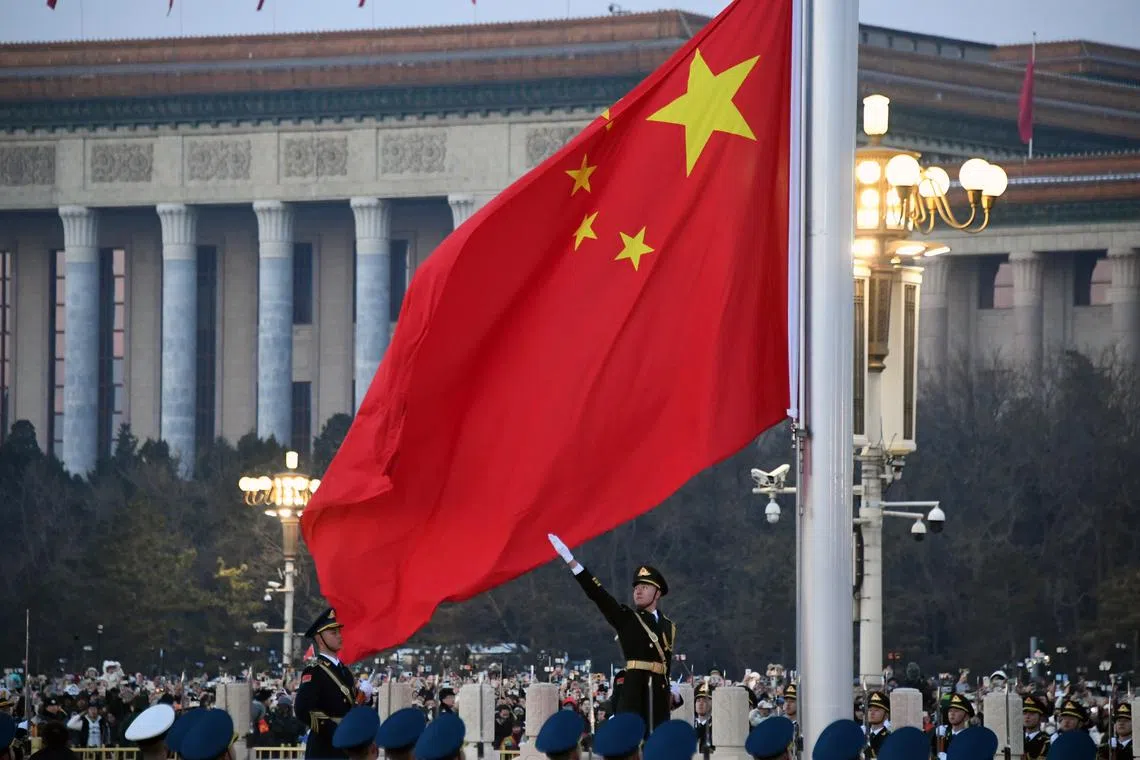China’s patriotic education law takes effect, draws mixed reactions from citizens
Sign up now: Get insights on Asia's fast-moving developments

With the legal change, schools and companies must include patriotic education in their curriculum and operations such as business management and work training.
PHOTO: EPA-EFE
BEIJING – A sweeping new law to get families, schools and companies to deepen patriotism in China kicked in on Jan 1, attracting both concern and support from parents and netizens.
The Patriotic Education Law, which was passed in October 2023, is set to “further encourage a strong social atmosphere for patriotism”, according to the state-owned People’s Daily on Jan 1.
There “is a practical need to unify thoughts and gather strength for the great cause of building a strong country and national rejuvenation”, Mr Zeng Jianli, a deputy director at the central propaganda department – the ruling party’s main publicity and censorship unit – told the newspaper.
With the legal change, schools must include patriotic education in their curriculum, while companies must do so in their operations, such as business management and staff training. Parents should also “include love of the motherland in family education”, says the law.
In addition, measures will be taken to strengthen patriotism among residents in Hong Kong and Macau, beef up publicity and education on unifying China, and strengthen communication with overseas Chinese and Taiwan residents.
Beijing has made it clear that reclaiming Taiwan, which China regards as part of its territory, is inevitable. And when public anger towards China’s zero-Covid policy spilled over to public protests in late 2022, overseas Chinese also organised similar demonstrations in countries such as Britain, the United States and Canada.
Under the new law, national symbols such as China’s flag, emblem and the country’s heroes and martyrs are not to be insulted.
Checks will be conducted, and failure to comply with the regulations will result in sanctions, according to the law.
Hong Kong, a Special Administrative Region (SAR) of China governed under a “one country, two systems” framework, plans to set up a patriotic education unit, while Macau said steps will be taken to strengthen patriotism in the SAR.
On the mainland, primary and middle schools in south-western Chongqing have recently rolled out study trips to the municipality’s monorail museum and its Hongyan Revolutionary History Museum to comply with the regulations.
Chongqing is home to China’s first monorail, and the Hongyan museum was the southern base for the Communist Party of China’s (CPC) central committee during the Japanese invasion.
In eastern Shandong province, schools are teaching students the significance of China’s national flag and emblem, and the contributions of the country’s heroes.
In Xinjiang, an autonomous region in north-western China, a school invited a Zhejiang University teacher known for her communist songs to speak about her experience in penning them.
Assistant Professor Dylan Loh at Nanyang Technological University’s Public Policy and Global Affairs programme told The Straits Times that the law came about as the CPC had “identified risks, particularly among some disenfranchised and politically apathetic youth”.
Said the China expert: “It is clearly unacceptable to depart from CPC hagiography and ideology, such as embracing Western ideas of democracy, freedom of speech.
“But now it is increasingly a problem for the party that people don’t care and want to make as much money as possible. That, seen through the party’s eyes, is also equally threatening for the legitimacy and longevity of the party.”
On the popular microblogging platform Weibo, a hashtag on the Patriotic Education Law has drawn some 98.1 million views and sparked about 11,000 discussion threads. It was also one of the most searched topics when the law was passed in October.
Reactions to the new law have been mixed, with netizens leaving both supportive comments and questions on whether love for a country should be enforced.
Some netizens also took a dig at party officials with family members who have migrated to the US or are currently studying there, and asked if that is patriotism.
Ties between the US and China have remained tense following differences over issues such as trade, technology, ideology and Taiwan. The US considers China a strategic rival.
Besides netizens, some parents wonder if students’ learning will be affected by the changes.
A parent in Beijing, who gave her name only as Mrs Fan, told ST she is concerned that any changes will “affect the development of critical thinking skills in schools”.
She said that schools may not allow probing questions about Chinese history.
Mrs Fan, 38, and her banker husband have an 11-year-old daughter who is studying at a British private school in Beijing.
“The opportunity to interact with people from other countries and understand their perspectives is a key reason why my husband and I decided to enrol our daughter – an only child – at a foreign private school,” she said.
Not all parents, however, share Mrs Fan’s worries.
Mr Li Yong, 42, whose daughter attends a public school in Beijing, “fully supports” the new law.
“What’s wrong with teaching our children patriotism?” he said.
Mr Li, who works as a project manager at a state-owned enterprise, said he has been concerned that the younger generation will grow up “morally bankrupt” because China’s rapid development in the recent decades has meant that “Chinese youth are more capitalistic than their parents”.
“Children and teenagers nowadays are all about money, and they have been influenced by what they see on television and on the Internet to worship celebrities and influencers,” he said.
“I guess if there’s one thing I’m worried about, it is that the new law will mean more homework for my daughter. She is busy enough at school.”



